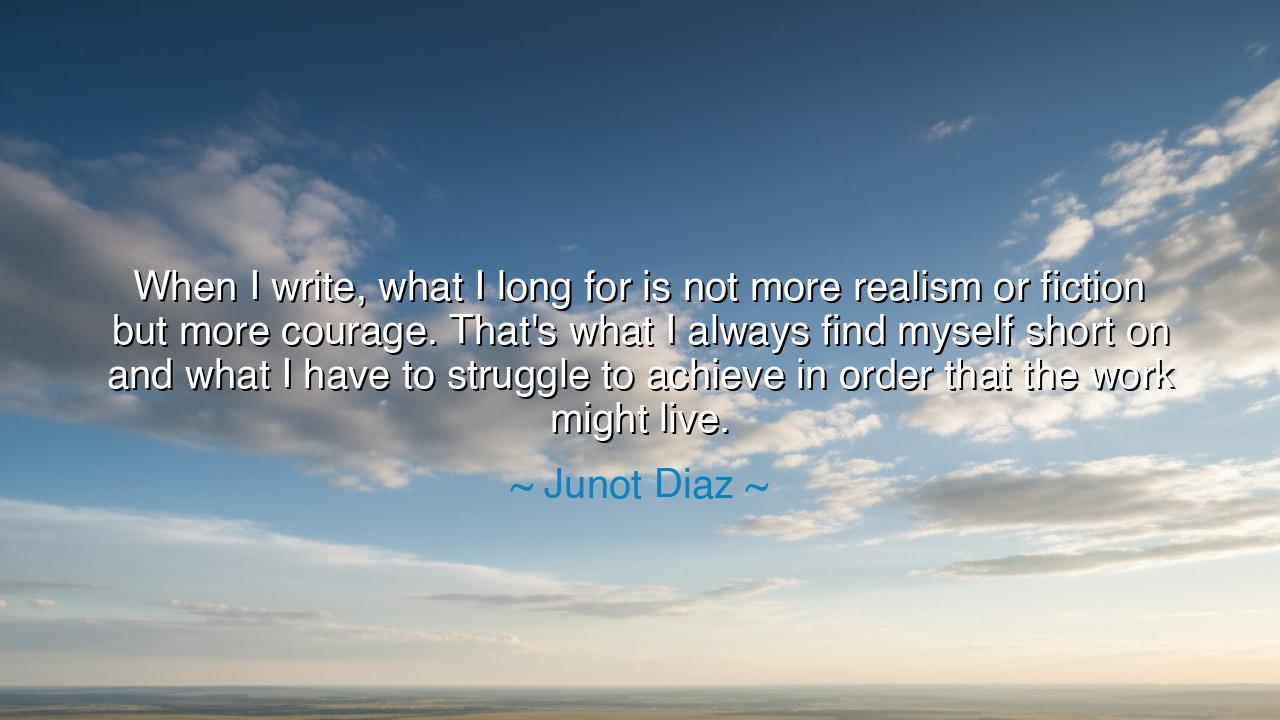
When I write, what I long for is not more realism or fiction but
When I write, what I long for is not more realism or fiction but more courage. That's what I always find myself short on and what I have to struggle to achieve in order that the work might live.






“When I write, what I long for is not more realism or fiction but more courage. That’s what I always find myself short on and what I have to struggle to achieve in order that the work might live.” Thus spoke Junot Díaz, the Dominican-American writer whose words carry the rawness of truth and the fire of confession. In this quote, Díaz reveals what every artist — indeed, every human being — comes to know when confronting the depths of creation: that the greatest obstacle is not skill, nor inspiration, but courage. For it takes bravery to face one’s own truth, to strip away pretense, and to bring forth into the world something that truly lives.
In his saying, Díaz speaks not only of writing, but of the eternal struggle between fear and authenticity. Many can mimic beauty or compose clever words; few can speak the truth of the heart without flinching. To write — or to live — with courage means to risk exposure, to walk without armor, to tell the story that one is most afraid to tell. The ancient poets knew this well. Homer, when he sang of Achilles, was not glorifying war alone, but the courage it takes to confront fate itself. So too does Díaz suggest that writing — like battle — demands the courage to face the self. The true battlefield is the page, and the enemy is one’s own fear.
“Not more realism or fiction,” he says — for technique and imagination are not enough to give breath to art. Realism gives form, fiction gives flight, but courage gives life. Without it, words are shells without soul, shadows without substance. Courage is the heartbeat within the work; it is what transforms sentences into spirit, and stories into mirrors that reflect human truth. The writer must dare not only to describe the world, but to reveal what it feels like to be alive within it — with all the pain, shame, and longing that truth entails. Díaz’s struggle is therefore universal: the artist’s war is not to perfect the craft, but to overcome fear enough to let the truth shine unguarded.
Consider the example of Anne Frank, a young girl who, hidden away during the horror of war, wrote in the quiet darkness of her confinement. She had no audience, no acclaim, and yet she wrote with courage unmatched. She spoke not only of fear, but of hope — not because it was safe to do so, but because it was necessary. Her words outlived the terror of her time and became a beacon for generations. Through her courage, her work gained life eternal. This is what Díaz means when he says that courage makes the work live — for only that which is honest, vulnerable, and brave can endure the ages.
To write or to create with courage is also to resist the world’s demand for safety. The writer who seeks to please will never transform; the artist who fears rejection will never awaken hearts. Every creation that truly matters has been born in defiance of fear. When Galileo wrote that the Earth moved around the sun, he risked his life for the truth. When Toni Morrison wrote of the hidden traumas of slavery, she broke silence that the world was content to keep. Such works live because they were written not with comfort, but with courage — because they dared to reveal what others hid, to speak what others feared.
Yet Díaz’s confession — “That’s what I always find myself short on” — reminds us that courage is not a constant possession. It must be fought for daily, renewed in every act. The artist, like the warrior, must face fear again each dawn. Every new page, every new creation, demands that same leap into the unknown. Courage does not mean the absence of fear, but the refusal to bow before it. And so, the struggle for courage is not a sign of weakness, but of sincerity — for only those who strive against fear can produce work that breathes with human truth.
Let this then be the lesson for all who seek to create, to lead, or to live deeply: do not pray for perfection — pray for courage. Do not wait until you are ready, for readiness is a mirage; begin while trembling, and let truth guide your hand. When fear whispers that your story is not worthy, answer with honesty. When shame urges you to hide, step forward anyway. Courage is not thunderous; it is quiet persistence, the will to keep writing even when the heart quakes.
So remember the wisdom of Junot Díaz: that courage is the soul of creation. Realism may describe the world, and imagination may shape it — but only courage brings it to life. In your own work, whatever it may be, let this be your mantra: to speak the truth, to dare the heart, to walk unguarded into the light. For when courage enters your art — or your life — it ceases to be mere effort; it becomes something living, something immortal. And through that courage, the spirit of your work — like all great works before it — shall live long after you are gone.






AAdministratorAdministrator
Welcome, honored guests. Please leave a comment, we will respond soon